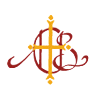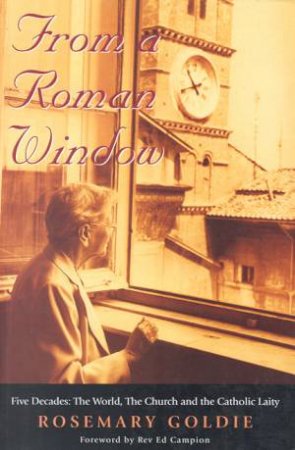Page Contents
The Catholic Church has always favoured the cooperation of faith and reason. So it has supported a distinctively Catholic intellectual life and aimed to argue rationally in ways that should be convincing to all.
Philosophy
Until the 1960s the “scholastic” philosophy of Thomas Aquinas was the Church’s official philosophy and dominated teaching in seminaries. Philosophy was compulsory in seminaries (usually in Latin) and often taught by philosophers highly trained in Rome. The story is told in ch. 4 of Corrupting the Youth: A History of Philosophy in Australia.

(MSC Archives)
As Dr P.J. Ryan explained in his 1934 lecture, ‘The fundamental tenets of scholasticism,’ a central doctrine of scholasticism was natural law ethics – that right and wrong are founded on the nature of humans (not tribal custom or utility or the command of God). Ryan was later the Sydney head of the anti-communist “Movement” and debated a communist spokesman in 1948 before an audience of nearly 30,000.
The Thomist philosopher Austin Woodbury founded the Aquinas Academy in Sydney in 1945 to teach philosophy to the laity. It was well-attended for thirty years. (Woodbury’s lectures) The Academy later taught spirituality and psychology. (Its history)
After the 1960s, seminaries shrank and Thomist philosophy became less popular, but seminary philosophy teaching still retained some orientation towards natural law teaching in ethics.
The 1961 book, Conscience and its Right to Freedom, by Eric D’Arcy, later head of Melbourne University’s Philosophy Department and Archbishop of Hobart, defended the rights of conscience and the rights of religious minorities to be free of state coercion. Another Melbourne philosopher, Max Charlesworth, wrote on a wide range of topics in analytic and continental philosophy and the philosophy of religion.
Peter Forrest‘s books God Without the Supernatural and Developmental Theism defend a speculative view of a God somewhat more constrained than in traditional theism.
Bioethics
Because of its natural law orientation, Catholic philosophy has differed from the mainstream on “life” issues like abortion, euthanasia, new medical technologies and health care allocation. Norman Ford, the Plunkett Centre for Ethics and Notre Dame’s Bioethics and Health Care Ethics program are among leaders in the field.
The bioethicist Anthony Fisher, author of Catholic Bioethics for a New Millennium, was appointed Archbishop of Sydney in 2014.
Theology
Theology was, like philosophy, central to seminary training and was taught by lecturers with extensive training, usually overseas. Thomas Hayden, a lecturer at St Patrick’s Seminary, Manly, in the early 20th century, argued that the early chapters of Genesis are “far less historical than we have at one time thought them,” but accepted the Papal condemnation of such views as Modernist.
David Coffey’s work on the Trinity emphasised the New Testament language of the gift of the Holy Spirit as in the baptism of Jesus, in preference to the language of incarnation of later Councils.
Rosemary Goldie, an expert on lay Catholic action was Undersecretary of the Pontifical Council for the Laity from 1967 to 1976. In recent years, many women, Catholic and Protestant, have become well-known in theology. (See the page on Women in the Australian Church.)
The Jesuit Gerald O’Collins has written on what can be learned about Jesus from his words and the fundamentals of theology.
Tracey Rowland has written on the Thomist tradition and on Benedict XVI. Her Catholic Theology introduces the different contemporary approaches to the subject.
Books on the nature of the Church itself include Neil Ormerod’s Re-visioning the Church. and Bishop Geoffrey Robinson‘s Confronting Power and Sex in the Catholic Church. A number of books by Paul Collins are critical of church structures.
The Australian Catholic Theological Association has coordinated events since 1975.
Apologetics
Apologetics, the defence of faith by argument in the public square, has had many practitioners in Australia. Michael Sheehan, Coadjutor Archbishop of Sydney in the 1920s and 30s, wrote a best-selling Apologetics and Catholic Doctrine which impressed schoolboys from B.A. Santamaria to Thomas Keneally.
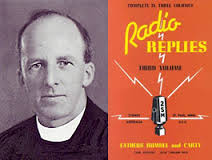
(Missionaries of the Sacred Heart)
Radio listeners in the mid 20th century were familiar with the “voice like worn sandpaper” of Dr Rumble, whose Question Box program answered rationally a host of questions on faith and morality sent in by often hostile listeners. Written collections of his answers were popular in the US and said to have sold seven million copies.
Sydney-born Frank Sheed was active in the Catholic Evidence Guild in London. He brought the movement to Australia in 1925 and lay speakers defended Catholic views in public meetings at the Sydney Domain and Yarra Bank (and in schools). With his wife Maisie Ward he founded the successful Catholic publishing firm Sheed and Ward.
Cardinal Pell’s Test Everything has elements of apologetics as well as wider reflections on faith. (review) Recently Greg Sheridan has made enthusiastic contributions with God is Good for You (2018) and Christians: The Urgent Case for Jesus in Our World (2021)
Literature
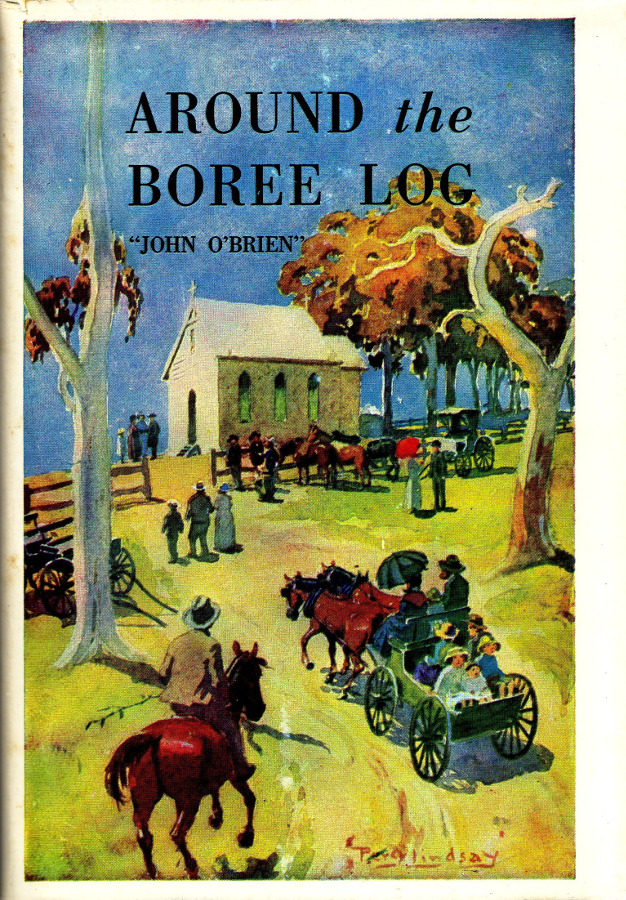
The popular poems of “John O’Brien” (Fr Patrick Hartigan) celebrated the culture of the poor rural Irish Catholic communities of south-western New South Wales. Well-known are ‘The Little Irish Mother‘, ‘At Casey’s After Mass‘, and ‘Said Hanrahan‘.
Ruth Park’s novels The Harp in the South and Poor Man’s Orange movingly bring to life an inner-city poor Irish Catholic community of the 1940s.
Morris West, a former Christian brother, achieved spectacular international success with his novels, selling some 60 million copies. The best-known are The Devil’s Advocate (1959), about a canonisation investigation in Italy, and The Shoes of the Fisherman (1963), about a fictional Slavic pope. Abuse of power in the Church was a frequent theme of his work.
Thomas Keneally‘s early novels, The Place at Whitton and Three Cheers for the Paraclete, were based on his experiences at St Patrick’s Seminary, Manly.
Christopher Koch’s novels, especially The Year of Living Dangerously and Out of Ireland, exhibited a Catholic sensibility without dealing with specifically Catholic themes. That is arguably true also of Martin Boyd, a Catholic at the end of his life.
Colleen McCullough’s popular 1977 novel The Thorn Birds, partly about a priest’s struggle between his vow of chastity and his ambition to become a cardinal, sold some 33 million copies.
An anthology is Edmund Campion’s Catholic Voices: Best Australian Catholic Writing (1996).
In literary theory, Tom Arnold (brother of Matthew Arnold) of Tasmania wrote A Manual of English Literature (1862). Sr Veronica Brady was a leading expert on Patrick White and Judith Wright.
(For drama and movies see the page on Architecture, Art, Drama and Music.)
James McAuley
Originally atheist, McAuley converted to Catholicism in 1952 after a sojourn at a New Guinea Mission. He co-founded Quadrant magazine and defended classical values in poetry, art and politics in The End of Modernity. His ambitious epic Captain Quiros imagined a Catholic history for Australia … more>
Poetry
Other poets with strong Catholic influences were Christopher Brennan, Francis Webb, Noel Rowe, Bruce Dawe and Peter Steele SJ.
Poet and literary critic Vincent Buckley was a prominent figure in Melbourne intellectual life in the 1960s.
Les Murray, the leading Australian poet of the last decades of the twentieth century, converted to Catholicism in his youth. (Murray’s biography) Stephen McInerney’s article ‘Les Murray’s sacramental poetics‘ JACHS 2020, describes the religious force of his poetry.
An older anthology is Paul Grano‘s Witness to the Stars: An Anthology of Catholic Verse by Australasian Poets (1946).
Social justice and political and legal theory
Catholic thought has a distinctive economic and political position, stemming from Leo XIII’s 1891 encyclical Rerum Novarum. In contrast to capitalism and socialism, it sees the ideal society as arising from cooperation between independent families, businesses, unions and governments. These ideas were promoted especially by the Campion Society in Melbourne from the mid-1930s; the story is told in Race Mathews’ Of Labour and Liberty: Distributism in Victoria 1891-1966 (review) and in oral histories. Later government policies such as the Hawke Government’s Accord had some resemblance to distributism. Greg Craven’s 2021 book, Shadow of the Cross: Catholic Social Teaching & Australian Politics argues for the continuing relevance of the tradition.
Catholic philosophy implies an objective view of rights and social justice. Its philosophy of law requires that law implement abstract objective principles of justice rather than simply follow “black letter” rules and precedents. One of the leading world theorists is John Finnis from Adelaide, later Professor of Law and Legal Philosophy at Oxford. The effects were seen in the High Court’s 1992 Mabo decision recognising native title, where the precedent of terra nullius was overthrown as incompatible with the deep legal value of equality of persons. (The story is told in ch. 15 of Corrupting the Youth.)
The Jesuit human rights lawyer Fr Frank Brennan has been a leading commentator on refugee issues and indigenous land rights.
Notre Dame University’s journal Solidarity publishes on Catholic social thought and secular ethics.
Catholics have had mixed views on environmental issues, with the topic having a low profile in scholastic and social justice thought but being promoted by a tradition of “green Catholics“.
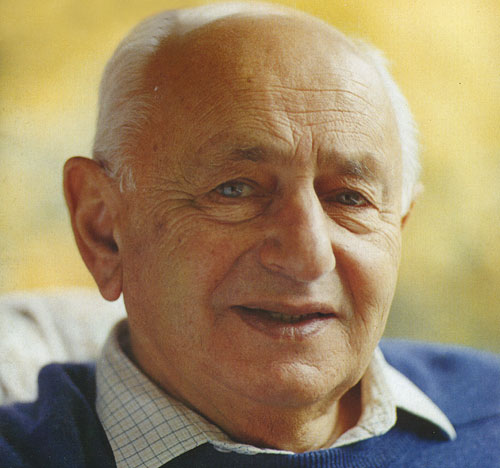
B.A. Santamaria and the Movement
B.A. Santamaria, one of the original members of the Campion Society, became known as the organiser of the secretive “Movement” which successfully fought communism in the unions in the 1940s and whose exposure led to the 1955 Labor Split. He was however a man of ideas and commentator for decades, “an ideologue with a European sensibility and a vast plan to reorder society according to a rational and divine order” who envisioned an Australia that was neither socialist nor capitalist. Gerard Henderson’s Santamaria is the definitive biography, while Bruce Duncan’s Crusade or Conspiracy? details the battles fought. Source material is in Patrick Morgan’s B.A. Santamaria: Your Most Obedient Servant and Running the Show. Much of Santamaria’s thought on public issues appeared in the Australian Bishops’ annual Social Justice Statements from 1940. (Santamaria interview 1996)
One of the many organisations associated with him was the Jesuit-run Institute of Social Order, which published the serious magazines of social issues Twentieth Century and Social Survey. They were opposed in the battle of ideas by the more leftist Catholic Worker, also from Melbourne.
Historiography
Australian Catholics have been particularly strong on telling their own story, starting with Cardinal Moran’s 1895 History of the Catholic Church in Australasia (1003 pages) and followed up by the books of ACHS founder Eris O’Brien.
Patrick O’Farrell (1933-2013) was the most celebrated historian of both Irish Australia and Catholic Australia. His books include The Catholic Church in Australia: A Short History; Documents in Australian Catholic History 1788-1968; The Catholic Church and Community: an Australian history and The Irish in Australia. A website on his work gives details.
Edmund Campion has written Australian Catholics (1987) and other books on Australian Catholic life.
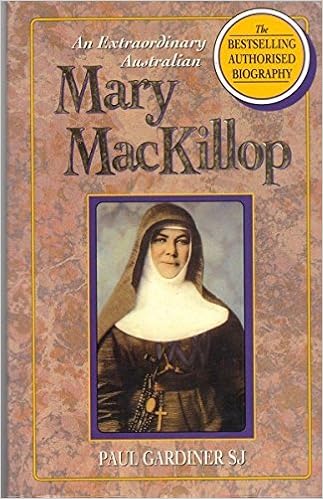
Biographies include Paul Gardiner’s Mary MacKillop, Philip Ayres’ Prince of the Church on Cardinal Moran, Brenda Niall’s award-winning Mannix, J. Franklin, G.O. Nolan and M. Gilchrist’s The Real Archbishop Mannix: From the Sources, (video) and John Luttrell’s Norman Thomas Gilroy. There have been many autobiographical writings by priests, religious and ex-religious, such as F.X. Gsell’s The Bishop with 150 Wives.
The well-resourced historical investigations of the Royal Commission into Institutional Responses to Child Sexual Abuse (2013-17) found high levels of abuse by Catholic clergy and religious and grave failings in the Church’s response. See the page on the Sexual Abuse Crisis.
The Australian Catholic Historical Society
The Society was founded in 1940 and has conducted a regular program of talks since then. It has published the Journal of the Australian Catholic Historical Society since 1954.
Science
Although there is no specifically Catholic science, scientific endeavours with a Catholic connection include Fr Julian Tenison Woods’ geological research and Fr Ernest Worms’ work on anthropology and linguistics in the Kimberley. Riverview Observatory has operated since 1909. Fr Edward Hayes’ 25-tonne collection of ethnographic and other Australiana is a treasure of the University of Queensland.
Sir John Eccles, the Nobel Prize-winning neurophysiologist, spent much effort on an anti-materialist theory of the interaction of mind and brain. The immunologist Sir Gus Nossal pointed out that the brains of Shakespeare and Aquinas did not differ from those of “the worst scribbler of the tabloid press”: the mind is not explained by the brain.
Linguist Anna Wierzbicka has applied her work to Jesus’s words in What Did Jesus Mean? Explaining the Sermon on the Mount and the Parables in simple and universal human concepts.
Catholic universities and colleges
Considerable efforts were made to found a Catholic university in Sydney around 1950 but were unsuccessful.
The Australian Catholic University was founded in 1991 by amalgamating four teachers’ colleges. It has since expanded to a complete university. The story is told in John Hirst’s Australia’s Catholic University: The first twenty-five years. (review) ACU contains the P.M. Glynn Institute for religion and public policy and the Golding Centre for Women’s History, Theology and Spirituality.
The University of Notre Dame Australia was established in Fremantle in 1989 and expanded to campuses in Sydney and Broome. Its degrees include a core curriculum of philosophy, ethics and theology. Research strengths include medicine and ethics and society. The role of Fr John Neill in its founding vision is described in the film The Quiet Man.
Besides seminaries, many centres and institutes have provided higher tertiary education. Some have become members of the University of Divinity in Melbourne and the Sydney College of Divinity. The Melbourne John Paul II Institute for Marriage and Family offered postgraduate degrees in such areas as bioethics and pastoral care from 2001 to 2018. The Catholic Institute of Sydney researches and teaches on theology, philosophy, and the humanities. The Broken Bay Institute specialises in theology and canon law.
Catholic residential colleges at secular universities were founded with the hope that they would contribute to intellectual life but that has occurred only sporadically.
The Christopher Dawson Centre in Tasmania promotes the role of the Catholic intellectual tradition in civilization.
Campion College
Campion College opened in western Sydney in 2006 as Australia’s first liberal arts college. It offers an integrated introduction to the ideas of Western civilisation with a focus on traditional Catholic thought.
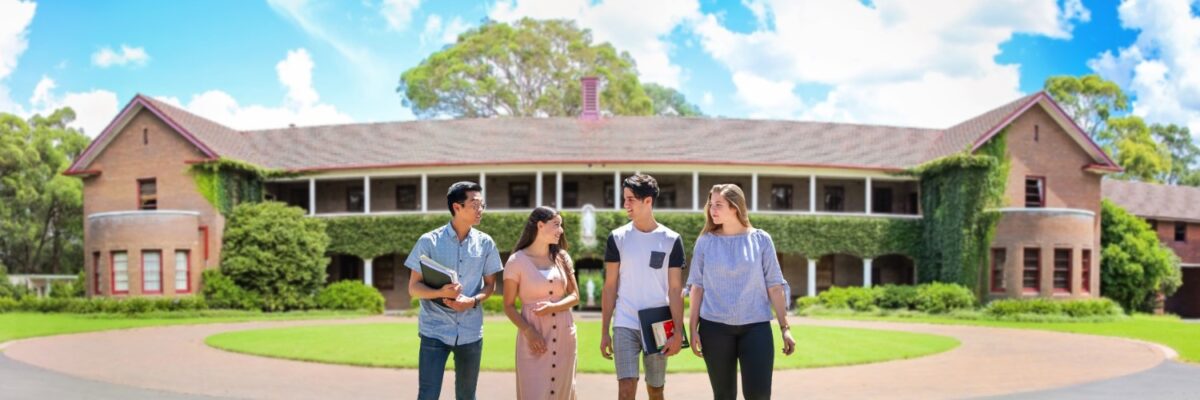
Journals and publishers
The Australasian Chronicle was founded in 1838 to defend Catholic principles and interests.
The Australasian Catholic Record (founded 1895) publishes on Australian church history, theology, ethics, pastoral care, mission, spirituality and education. In the mid-twentieth century, it was known for its column on subtle questions of moral theology, such as “Is it permitted to deliberately confess to a deaf priest?”
Annals Australasia, founded in 1889, was edited for most of the years since 1964 by Fr Paul Stenhouse as a general magazine of Catholic intellectual culture. At a more polemical level, Eureka Street AD2000, and MercatorNet have debated social and church issues in recent decades.
A high intellectual standard of religious journalism was maintained by such figures as Brian Doyle of the Brisbane Catholic Leader, Stephen Crittenden of ABC Radio’s Religion Report and Geraldine Doogue of ABC TV Compass.
The publishers Connor Court, St Paul’s, Garratt Publishing and ATF Press have published many books on Catholic themes.
See also the page on the Catholic Press in Australia.
